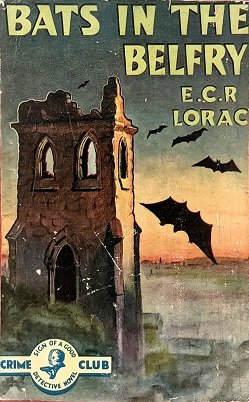9 October 2023
To have bats in one’s belfry is slang for being mentally unbalanced, eccentric, or odd. A belfry, in the most common sense in use today, is a bell chamber at the top of a tower, which in the slang phrase is a metaphor for the head. The slang expression is American in origin and relatively recent, but belfry is a word that dates back centuries.
Belfry comes into English from the Anglo-Norman berfrai, a word that is first recorded in the late twelfth century. The French term comes from either the medieval Latin berefredus or a proto-Germanic word *bergfrid, meaning castle or keep. The Norman dialect of Old French, from which Anglo-Norman descends, differs from standard Old French in that it was heavily influenced by Germanic words; Norman comes from Norseman. The Norman dialect may have gotten the word from either source. But in either case, the Latin word is itself a borrowing from the Germanic, so that is the ultimate source regardless.
The shift from /ɹ/ to /l/ occurred by the fifteenth century, we see the shift in Anglo-Norman by the late fourteenth century, and in English by the fifteenth. This particular consonant shift is unsurprising. The English liquid consonants, that is /ɹ/ and /l/, are easily interchangeable. And in this particular case, the association with bell probably influenced the shift to /l/ as well.
The original sense of berfrai was that of a shelter from missiles used during a siege. Later it came to refer to such a shelter at the top of a wooden tower on wheels used as a siege engine. We see this sense in the late fourteenth-century poem Cleanness:
“Þenne watz þe sege sette þe ceté aboute,
Skete skarmoch skelt, much skaþe lached;
At vch Brugge a berfrey on basteles wyse
Þat seuen syþe vch a day asayled þe ȝates.(Then the siege was set about the city,
Skirmishes sharply fought, much injury suffered;
At each drawbridge a belfry in a moveable tower,
That seven times each day assailed the gates.)
The bell tower sense appears by the mid fifteenth century. We see it in a poem about Thomas Becket from that period:
Thomas rides fro Rome, þe man þat right kennes;
he faris forth by a faire towne, Pise it is hotyne.
There fyndes he masons, upon a toure makand
A belfry of alabastre, þere belles shul hengyne.(Thomas rides from Rome, the man that teaches rightly,
He travels by a fair town, Pisa it is called,
There he finds masons building upon a tower
A belfry of alabaster, where bells shall hang.)
The tower here is what would become known as the Leaning Tower of Pisa, which was under construction during Thomas’s lifetime in the twelfth century.
The phrase bats in the belfry, however, would have to wait a few hundred years. It starts appearing in print in the closing years of the nineteenth century. Here is the earliest use I know of, from the Searchlight newspaper of Redding California of 7 September 1897. The editor of that paper is sniping at a rival publication:
THE SHASTA COURIER waxes sarcastic about that “awful eastern cyclone.” Bro. Carter seems to think that Redding reporters have “bats in the belfry” and “rats in the garret.” It’s all a mistake. The reporter in question has not passed the wind on the stomach epoch of his existence. Paregoric is wanted, Bro. Carter, not sarcasm.
And there is this, a few months later, Memphis, Tennessee’s Commercial Appeal of 27 February 1898. The piece supposedly records the conversation between two dogs:
“We’re all mad, you know, they say,” I ventured—
“We have a neat little way of saying it in French,” he said, flipping his tail impertinently around.
“What is it in English?”
“Bats in the belfry!”
“Ha-ha!”
Of course, the phrase is not from French. The joke is playing on the fact that the readers will recognize it as a current slang phrase. This quotation is evidence that the phrase was in widespread use by this point.
As to why bats, that is twofold. First, belfries are common roosting places for bats. Second, it alliterates. And the idea of creatures flitting about inside one’s head is an apt, if rather insulting, metaphor for insanity.
Sources:
“All Sorts and Conditions.” Commercial Appeal (Memphis, Tennessee), 27 February 1898, 4/7. ProQuest Historical Newspapers.
Anglo-Norman Dictionary, 2007, s.v. berfrai, n.
“Cleanness.” In The Poems of the Pearl Manuscript, fourth edition. Malcolm Andrew and Ronald Waldron, eds. Exeter: University of Exeter Press, 2002, lines 1185–88. London, British Library, MS Cotton Nero A.x, fols. 73r–v.
Green’s Dictionary of Slang, n.d., s.v. belfry, n.
Middle English Dictionary, 2019, s.v. berfrei, n.
Oxford English Dictionary, second edition, 1989, s.v. belfry, n.
Searchlight (Redding, California), 7 September 1897, 4/1. ProQuest Historical Newspapers.
“Seint Thomas of Caunterbery.” In A. Brandl, “Thomas Beckets Weissagung über Eduard III un Henrich V,” Archiv für das Studium der Neueren Sprachen und Literaturen, 102, 1899, 354. Oxford, Bodleian Library, Hatton 56, fol. 45a. HathiTrust Digital Archive.
Image credit: Unknown artist, 1937. Collins Crime Club. Wikimedia Commons. Fair use of a low-resolution scan of the image to illustrate the topic under discussion.

